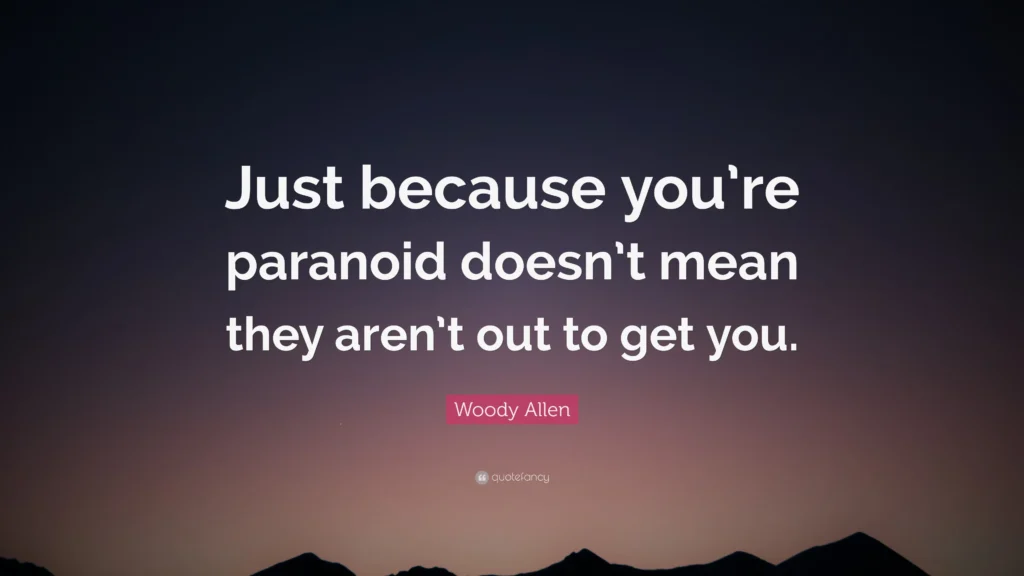Paranoia can transform even the most mundane moments into an intricate web of suspicion and anxiety. For those who live with this heightened sense of vigilance, everyday interactions become fraught with uncertainty, where every comment and glance is scrutinized for hidden meanings. This constant state of alertness not only shapes their perceptions but also dictates how they navigate the world around them. In this exploration, we delve into the common phrases and thoughts that frequently echo in the minds of paranoid individuals, shedding light on the intricate patterns of their thinking and the challenges they face in trusting their surroundings.
| Statement Number | What They Say | Explanation |
|---|---|---|
| 1 | “Why would they say that? Do you think they meant something else?” | Overanalyzes conversations and assumes hidden meanings. |
| 2 | “I swear that car has been behind me for too long.” | Feels suspicious about cars following them. |
| 3 | “Did you hear that? That didn’t sound right.” | Considers every noise a potential threat. |
| 4 | “I think my phone is listening to me.” | Believes targeted ads are proof of being watched. |
| 5 | “Why did they look at me like that?” | Assumes negative judgment from others’ glances. |
| 6 | “What if I forgot to lock the door?” | Constantly doubts if they secured their home. |
| 7 | “Why haven’t they texted back yet? Something’s wrong.” | Interprets silence as a sign of trouble. |
| 8 | “What if I left something embarrassing open on my laptop?” | Fears accidental exposure of private information. |
| 9 | “What if they’re just being nice to my face?” | Questions the sincerity of people’s kindness. |
| 10 | “This feels too easy. What’s the catch?” | Believes good outcomes must have hidden problems. |
| 11 | “What if that email wasn’t really from my bank?” | Doubts the authenticity of online communications. |
| 12 | “That person laughed — was it about me?” | Thinks laughter is directed at them personally. |
| 13 | “If I don’t do this, something bad might happen.” | Feels compelled to perform rituals to avoid disaster. |
| 14 | “What if they only invited me out of pity?” | Questions their value in social situations. |
| 15 | “What if I said that weird?” | Replays conversations, worrying about how they came across. |
| 16 | “I have a bad feeling about this.” | Experiences gut feelings that something is wrong. |
Understanding Paranoia
Paranoia is a feeling that makes people think others are out to get them or that something bad is going to happen. It can be very overwhelming and can change how a person thinks about things. For example, someone who is paranoid might think that when a friend says something nice, they are actually being mean. This kind of thinking can make it hard for them to enjoy life or trust anyone around them.
Understanding paranoia is important because it helps us be more compassionate toward those who struggle with it. Many times, paranoid thoughts are not based on reality, but they feel very real to the person experiencing them. By learning about paranoia, we can help our friends feel supported and understood, which can make a big difference in their lives.
Frequently Asked Questions
What is paranoia?
Paranoia is a mental state where a person feels constantly on edge, fearing threats or danger even when they aren’t there.
Why do paranoid people overanalyze conversations?
Paranoid individuals often think harmless comments have hidden meanings, causing them to replay conversations to uncover supposed agendas.
How do paranoid people react to everyday sounds?
They often perceive normal noises as potential threats, leading them to check their surroundings for danger.
Do paranoid people believe their devices are spying on them?
Yes, they often think their phones or computers listen to them, especially when they see targeted ads related to their conversations.
Why do paranoid individuals doubt others’ intentions?
They frequently suspect that people’s kindness is insincere, questioning if they are being tolerated rather than genuinely liked.
What triggers paranoia about social situations?
Paranoia can make individuals worry about how they are perceived, leading them to second-guess their words or actions after social interactions.
How can paranoia affect daily life?
It can create constant anxiety, making simple tasks, like checking if a door is locked, feel overwhelming and impossible to relax.
Summary
Paranoia can make everyday life feel tense and uncertain. People who experience paranoia often overthink simple situations, believing something bad is about to happen. For instance, they might question innocent comments, worry that someone is watching them, or fear that their devices are eavesdropping. They constantly analyze their surroundings and social interactions, leading to anxiety about what others think or whether they’ve made mistakes. This mindset can make even routine tasks, like checking locked doors or waiting for a text, feel overwhelming. Understanding these behaviors can help us support those who struggle with paranoia.

